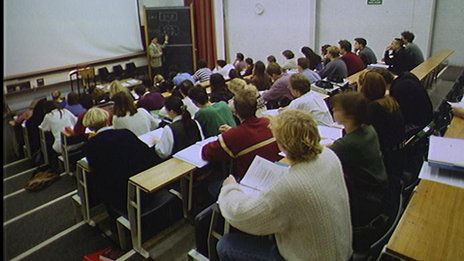當前位置: Language Tips> 雙語新聞
Higher fees led to 17% drop in UK undergraduates
分享到

|
The government says undergraduate numbers have 'returned to record levels'. There was a 17% fall in the number of first year undergraduates at UK universities in the first year of higher tuition fees, official figures show. In 2012-13 UK universities were allowed to treble their yearly fees to £9,000. England saw a 12% fall in new full-time undergraduate students overall. The government acknowledged the fall but stressed that demand for full time higher education has already "returned to record levels". A spokesperson for Department for Business, Innovation and Skills said the figures were influenced by a higher number of students taking up places the previous year, rather than having a gap year. "A reduction in entrants in 2012 was well documented and the numbers were affected by the significant number of students who opted not to defer their place from the year before," she said. 'Direct consequence' The decline had not continued into the current year, she added. "Application rates for some of the most disadvantaged young people have risen to an all time high in England and more students than ever before are being successful in securing a place at their first choice institution." The figures, collated by the Higher Education Statistics Agency (Hesa), are official confirmation of other indications that there was a fall in the number of people going to university last year. Previously released figures had shown declines in applications and offers of places, and the admissions body Ucas also reported a fall. In Scotland, where the government still pays for the tuition of Scottish students studying within the country, there was a 2% rise in the number of students taking up places on full-time undergraduate courses. The academics' union, UCU, however, said the overall decline was a direct consequence of the rise in tuition fees. The union's general secretary, Sally Hunt, said it was "no great surprise that the number of students going to university fell off considerably". She also believes there may be long-term effects. "Only the government seemed to think the policy was progressive and, while we have seen a recovery in the number of people applying to university, the fear remains that some may never fulfil their potential because of the new funding regime," she added. The Hesa figures also show a one per cent decline in non-EU students coming to the UK to study. A rise in the numbers of students from China and Hong Kong was off-set by a 25% fall in Indian students. It has previously been suggested they are being put off from the expense of study in the UK by a fall in the value of the rupee, and by improvements in Indian universities. |
英國政府表示本科生數量“降至新低”。 官方數據顯示,在第一年高昂的學費面前,英國大學的本科生的數量減少了17%。 在2012-13年間,英國大學被默許增加每年的學費至9000英鎊。 英格蘭新的全日制本科學生整體減少了12%。 政府承認總體數量有所減少,但強調對全日制高等教育的需求已經“回到過去的水平”。 英國政府商業創新和技術部的發言人表示,這數據受到了一些學生的影響,他們更多是提前一年申請上大學的,而不是選擇間隔年。 她表示:“2012年的新生的減少也揭示,新生數量受到相當一部分學生的影響,他們沒有選擇從一年前推遲他們的位置。” "直接的后果" 下降并沒持續到今年,她補充道。 “在英國,一些處于弱勢地位的年輕人的申請率已升到了一個前所未有的高度,比以往更多的學生成功地在他們的首選學校取得了一席之位。” 由英國高等教育統計局整理的數據,可以作為去年上大學人數減少跡象的官方確認。 此前發布的數據顯示申請數和錄取通知書發放數量有所下降,招生機構英國高校聯合招生委員會也報道了下降。 而在蘇格蘭,政府仍然為蘇格蘭學生在國內的學習付費,全日制本科生人數總體有2%的增長。 大學聯盟總秘長——薩莉.亨特表示,上大學的學生人數大幅度減少沒什么好驚訝的。 她還認為這可能存在長期影響。 她表示:“只有政府認為政策是進步的,雖然我們已經看到申請大學的數量在恢復,但由于新的融資制度,人們仍然有顧慮,而有些人可能永遠不會實現他們的潛力。” 英國高等教育統計局整理的數據同時顯示了非歐盟學生來英國上大學人數減少了1%。 而來自中國內地和香港學生人數的上升被印度學生下降了25%的數量所抵消。 之前有跡象表明,由于盧比的貶值和印度大學整體的進步,印度的學生在英國高昂的留學費用面前望而卻步。 (譯者 歐公子 編輯 丹妮) |
上一篇 : 20個習慣讓你成為幸福的人
下一篇 : 帶你讀懂中國元宵節
分享到
關注和訂閱


電話:8610-84883645
傳真:8610-84883500
Email: languagetips@chinadaily.com.cn